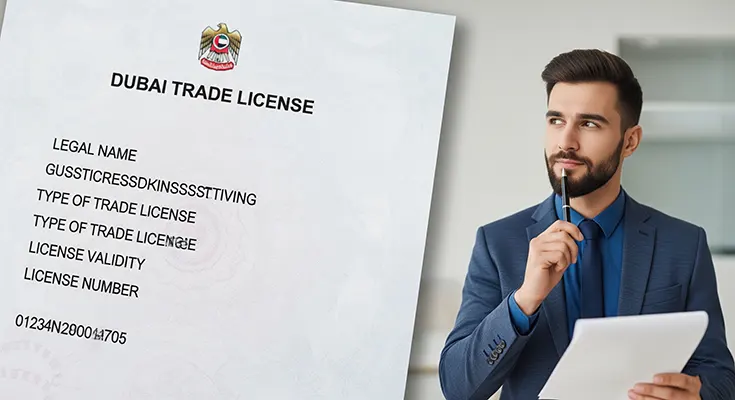Key Takeaways:
- Obtaining a trade license is the fundamental legal requirement for any Business setup in Dubai.
- The process begins with defining your business activity and choosing the appropriate legal structure (e.g., LLC, Sole Proprietorship, Free Zone Establishment).
- Reserving a unique trade name that complies with UAE regulations is a mandatory early step.
- You will need to secure a physical business location (or a virtual office/flexi-desk in a free zone) and obtain a tenancy contract.
- The application process differs slightly between mainland and free zone setups, involving either the Department of Economy and Tourism (DET) or the specific Free Zone Authority.
A trade license is the cornerstone of any legal Business setup in Dubai. It’s the official document that permits you to conduct specific commercial activities within the emirate. Without it, your business cannot legally operate. While the process is streamlined and efficient, especially with the right guidance, it involves several critical steps that must be followed precisely. Understanding each phase, from initial planning to final issuance, is key to a smooth and successful business launch in this dynamic global hub.
Preliminary Steps Before Applying for a Trade License for Business setup in Dubai
Before you even fill out an application form, there are crucial preliminary decisions that will shape your trade license application for a Business setup in Dubai.
- Define Your Business Activities: This is arguably the most critical first step. You must clearly identify the exact nature of the business activities you intend to conduct. Dubai’s Department of Economy and Tourism (DET) and various Free Zone Authorities have extensive lists of permissible activities (e.g., general trading, IT consultancy, retail, real estate, media services). Your chosen activities will dictate the type of license you need (Commercial, Professional, Industrial, etc.) and any additional approvals required from other government bodies (e.g., healthcare activities need DHA approval, food-related activities need Dubai Municipality approval). Each license typically allows a maximum of 10 activities, so list all that apply.
- Choose Your Legal Structure: Your legal structure defines the legal framework of your company, impacting ownership, liability, and governance. Common options for a Business setup in Dubai include:
- Limited Liability Company (LLC): Popular for mainland setups, offering limited liability to shareholders. Recent reforms allow 100% foreign ownership for many activities.
- Sole Proprietorship: For single owners, often suited for professional services. May require a Local Service Agent (LSA) for expatriates in mainland.
- Civil Company: For professional partnerships, often requiring specific professional qualifications.
- Free Zone Establishment (FZE) / Free Zone Company (FZCo): Common in free zones, offering 100% foreign ownership, full repatriation of profits, and customs duty exemptions within the free zone.
- Branch Office: For existing foreign companies wishing to establish a presence in Dubai. The choice of legal structure is fundamental and should align with your business goals and future expansion plans.
- Reserve a Trade Name: Your company’s name must be unique, adhere to UAE naming conventions (e.g., no offensive language, no religious references, no names of government entities, must include the legal suffix like LLC or FZCo), and not be already in use. You will submit your preferred names (usually 3-5 options) to the relevant authority (DET for mainland, or the Free Zone Authority) for approval and reservation.
- Determine Your Business Location: For a mainland Business setup in Dubai, a physical office space with an Ejari-registered tenancy contract is generally mandatory. For free zones, the requirements vary; many offer flexible solutions like shared workstations (flexi-desks), virtual offices, or dedicated offices, with the number of allowed visas often tied to the size of the chosen office solution.
These initial decisions form the bedrock of your trade license application and significantly influence the subsequent steps and requirements.
Documents Required for a Trade License for Business setup in Dubai
Gathering the correct documentation is a critical step in streamlining the trade license application process for a Business setup in Dubai. Requirements may vary slightly between mainland and free zone entities, and based on your chosen legal structure and activities. However, a general list includes:
- Application Form: Duly completed and signed by all partners/shareholders and the appointed manager.
- Passport Copies: Clear copies of passports for all shareholders, directors, and the appointed manager.
- Emirates ID Copy: For UAE residents, a copy of their valid Emirates ID.
- Residence Visa Copy/Entry Stamp: If applicable, for non-residents entering the UAE.
- No Objection Certificate (NOC): If a shareholder or manager is currently employed in the UAE, an NOC from their current sponsor may be required (less common now for new mainland setups, but still sometimes applicable in specific free zones or for certain government employees).
- Initial Approval Certificate: This is a preliminary approval from the relevant authority (DET or Free Zone Authority) signifying no objection to your business concept, legal form, and activities.
- Trade Name Reservation Certificate: Proof that your chosen business name has been approved and reserved.
- Memorandum of Association (MOA) / Articles of Association (AOA): For LLCs and other corporate entities, this document outlines the company’s structure, share capital, and management. It often needs to be notarized. For sole establishments, a Local Service Agent (LSA) agreement may be required.
- Tenancy Contract / Lease Agreement & Ejari Registration: For mainland companies, a valid lease agreement for your office space registered with Ejari (Dubai’s RERA system for tenancy contracts) is mandatory. For free zones, a lease agreement for your chosen office solution from the Free Zone Authority is required.
- External Approvals (if applicable): Depending on your business activities (e.g., food trading, medical services, financial services, education), you may need approvals from other government departments or regulatory bodies before the final trade license is issued.
- Proof of Capital: While not always a strict requirement for all legal forms or free zones, some activities or legal structures may require a bank letter confirming deposited share capital.
- Business Plan: For certain activities or free zones, a brief business plan outlining your objectives, services, and market strategy may be requested.
It is highly advisable to consult with a business setup consultant to ensure you have all the precise documents needed for your specific scenario.
Application Process for Mainland Business setup in Dubai
The process for obtaining a mainland trade license for a Business setup in Dubai is primarily handled by the Department of Economy and Tourism (DET).
- Step 1: Initial Approval & Name Reservation:
- Submit an initial application to DET, specifying your chosen business activities and legal structure.
- Simultaneously, apply for trade name reservation.
- Once approved, you will receive an Initial Approval Certificate and a Reserved Trade Name Certificate.
- Step 2: MOA/LSA Agreement Notarization:
- Draft the Memorandum of Association (MOA) for LLCs or a Local Service Agent (LSA) agreement for sole establishments.
- This document must be digitally signed via DED’s platforms or physically notarized at a Notary Public in Dubai.
- Step 3: Secure Physical Office Space & Ejari Registration:
- Lease a commercial office space that aligns with your business activities.
- Register your tenancy contract with Ejari through the Dubai Land Department. This unique Ejari number is crucial for the trade license.
- Step 4: Obtain External Approvals (if required):
- If your business activity falls under regulated sectors, you must secure approvals from relevant government entities (e.g., Dubai Municipality, DHA, Telecommunications and Digital Government Regulatory Authority, etc.). These approvals are often prerequisites for the final license.
- Step 5: Submit Final Application and Fees:
- Submit all gathered documents (Initial Approval, Trade Name Certificate, MOA/LSA, Ejari, passport copies, external approvals) to DET through their online portal (e.g., Invest in Dubai platform) or via an authorized service center.
- Pay the applicable licensing fees. These fees vary based on the license type, activities, legal form, and sometimes the number of partners.
- Step 6: License Issuance:
- Upon successful review and payment, DET will issue your official trade license. This document will list your company name, legal form, licensed activities, and validity period (usually one year, renewable annually).
The entire process, from initial approval to license issuance, can typically take from a few days to a few weeks, depending on the complexity of your activities and the responsiveness of external authorities.
Application Process for Free Zone Business setup in Dubai
The process for obtaining a trade license in a Free Zone for Business setup in Dubai is often more streamlined and is managed by the specific Free Zone Authority itself.
- Step 1: Choose Free Zone, Activity & Legal Form:
- Select the free zone that best suits your business (e.g., Meydan Free Zone in Dubai, DMCC, JAFZA, DAFZA). Each free zone specializes in certain industries and offers different packages.
- Define your business activities and choose the appropriate legal form (FZE, FZCo, Branch).
- Step 2: Submit Initial Application & Documents:
- Submit a preliminary application form to the chosen Free Zone Authority.
- Provide initial documents, typically including passport copies, CVs of shareholders/directors, and a business plan (if required by the free zone).
- Step 3: Trade Name Reservation & Initial Approval:
- The Free Zone Authority will check and reserve your proposed trade name.
- Once approved, they will issue an initial approval.
- Step 4: Sign MOA/AOA (if applicable) & Lease Agreement:
- For FZCo or FZE structures, the Free Zone Authority will prepare the Memorandum of Association (MOA) and Articles of Association (AOA) for signature by shareholders.
- You will also sign a lease agreement for your chosen office solution (flexi-desk, dedicated office, etc.) within the free zone.
- Step 5: Pay Fees and Receive License:
- The Free Zone Authority will issue a proforma invoice detailing all setup and licensing fees.
- Upon payment, the Free Zone Authority will issue your trade license and Certificate of Incorporation (or equivalent).
- Step 6: Establishment Card and Visa Application (Post-License):
- Once the trade license is issued, the Free Zone Authority will help your company obtain its establishment card (immigration file).
- This allows you to proceed with applying for residency visas for shareholders and employees.
Free zone setups are often faster, with licenses sometimes issued within a few days or even instantly, depending on the free zone and the complexity of the activity. This makes them a popular choice for foreign investors seeking rapid Business setup in Dubai.
How Can Meydan Free Zone Help?
For entrepreneurs looking to understand “How to get a trade license for Business setup in Dubai?”, Meydan Free Zone in Dubai offers a streamlined and highly efficient process. Meydan Free Zone in Dubai is known for its user-friendly digital platform and supportive approach, making the licensing journey straightforward.
They provide clear guidance on selecting appropriate business activities and legal structures, ensuring compliance from the outset. Meydan Free Zone in Dubai facilitates the trade name reservation and initial approval process, handling the necessary communications with the authorities on your behalf. Their attractive packages often include flexible office solutions, which simplifies the physical presence requirement, and they seamlessly integrate the lease agreement into the overall setup. By consolidating many steps and providing dedicated support, Meydan Free Zone in Dubai significantly reduces the administrative burden and potential delays associated with obtaining a trade license, allowing businesses to secure their license and begin operations in Dubai quickly and confidently.










